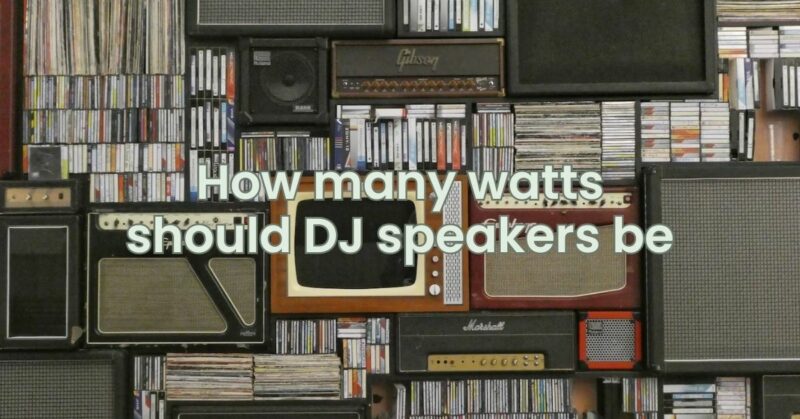Choosing the appropriate wattage for DJ speakers is crucial to deliver powerful and engaging sound during performances. However, determining the ideal wattage can be a complex task, as it depends on various factors such as venue size, desired volume levels, and music genre. This article aims to provide guidance and insights to help DJs select the right wattage for their speakers, ensuring an optimal audio experience for both themselves and their audience.
- Understanding DJ Speaker Wattage:
- Explaining the concept of speaker wattage and its importance in DJ setups.
- The relationship between wattage, sound pressure levels, and overall performance.
- Differentiating between continuous power and peak power handling.
- Evaluating Venue Size and Crowd Capacity:
- Discussing the impact of venue size on speaker wattage requirements.
- Matching speaker power to effectively cover different audience capacities.
- Considering the distribution of speakers and positioning for optimal coverage.
- Desired Volume Levels and Music Genre:
- Identifying the desired volume levels for DJ performances.
- Understanding the relationship between wattage, SPL, and perceived loudness.
- Adapting wattage requirements based on the dynamics and energy of different music genres.
- Multiple Speaker Setups:
- Exploring the benefits and considerations of using multiple speakers.
- Configuring speaker setups, including mono, stereo, and surround sound.
- Power distribution and amplifier considerations for multi-speaker systems.
- Speaker Sensitivity and Efficiency:
- Understanding speaker sensitivity and its impact on wattage requirements.
- How higher sensitivity speakers can achieve desired volume levels with lower wattage.
- Balancing sensitivity, wattage, and overall system efficiency.
- Headroom and Power Reserve:
- Explaining the importance of headroom in DJ setups.
- The benefits of having power reserves beyond regular requirements.
- Avoiding distortion and speaker damage by ensuring ample headroom.
- Additional Considerations:
- Factoring in room acoustics and potential sound reinforcement equipment.
- Future scalability and expansion of the DJ setup.
- Budget considerations and balancing wattage requirements with cost.
Conclusion: Selecting the appropriate wattage for DJ speakers involves considering venue size, crowd capacity, desired volume levels, and music genre. By understanding these factors and evaluating speaker sensitivity, DJs can ensure their sound systems deliver the necessary power and performance for an immersive and engaging experience. It is essential to strike the right balance between wattage, speaker efficiency, and headroom to achieve optimal sound quality and avoid potential issues during DJ performances.


